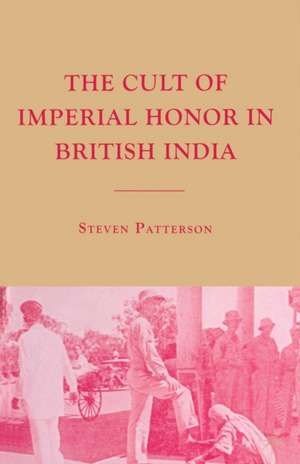The Cult of Imperial Honor in British India
Autor S. Pattersonen Limba Engleză Paperback – 22 mai 2009
Preț: 384.09 lei
Nou
Puncte Express: 576
Preț estimativ în valută:
73.51€ • 76.16$ • 61.34£
73.51€ • 76.16$ • 61.34£
Carte tipărită la comandă
Livrare economică 21 martie-04 aprilie
Preluare comenzi: 021 569.72.76
Specificații
ISBN-13: 9781349377459
ISBN-10: 1349377457
Pagini: 273
Ilustrații: X, 263 p.
Dimensiuni: 140 x 216 x 15 mm
Greutate: 0.32 kg
Ediția:1st ed. 2009
Editura: Palgrave Macmillan US
Colecția Palgrave Macmillan
Locul publicării:New York, United States
ISBN-10: 1349377457
Pagini: 273
Ilustrații: X, 263 p.
Dimensiuni: 140 x 216 x 15 mm
Greutate: 0.32 kg
Ediția:1st ed. 2009
Editura: Palgrave Macmillan US
Colecția Palgrave Macmillan
Locul publicării:New York, United States
Cuprins
Introduction The Cult and Maintenance of Honor A Middle-Class Method: Building the Steel Frame of the Raj Queen of the Earth: An Empire of Honor The Bungalow: A Clearing in the Jungle
Recenzii
"One of the strengths of this book is that it expands the fields of race, gender, and class analysis, with which most new imperial historians preoccupy themselves, to a new category that influenced Britons in India. Another marked strength is the sophisticated development of theory that helps build a base for the argument of the book. This book has an impressive source base that includes several primary sources and oral interviews in addition to major secondary sources. A delight to read." - H-Albion
"Patterson s examination of masculinity and male codes of honor (racial, legal, and social) as a central element underpinning the British Raj ads significantly to scholarship on gender and imperial rule, as well as metropolitan Victorian and Edwardian British society. He eloquently unpacks the "white man s burden," showing how central maleness was to racial superiority, and how each was maintained through the specific norms and institutions of the Raj. His brisk prose delights as he marshals the latest theoretical and empirical literature, along with revealing an array of new sources for uncovering the interstices of whiteness and civility, honor and power, disclosing the micropolitics of force behind gentlemanly virtue." - Jonathan Judaken, author of Jean-Paul Sartre and the Jewish Question and editor of Naming Race, Naming Racisms, Associate Professor of modern European cultural and intellectual history at the University of Memphis
"This book provides a better understanding of how aristocratic ideas and behavior, most notably those associated with the many meanings of honor, made the Raj for Anglo-Indians and British officials more comprehensible and workable, often ironically in the case of those with little if any association with such an aristocracy. That irony helps provide a refreshingly new approach to the study of Anglo-Indians and the other white rulers of nineteenth- and twentieth-century British India. In doing so, it will also be of assistance to students of imperialism and colonialism in general, as aristocratic adaptations and references to 'character' were not unique to the British or to the Raj." - Peter H. Hoffenberg, Associate Professor of History, University of Hawai i, Manoa
"Steven Patterson's thoughtful and perceptive study shows how Anglo-Indian society's lingering, if attenuated, code of honor sustained the increasingly beleaguered imperial authority of the British Raj. This book is a valuable and timely addition to the rich scholarship on imperial culture." - Abraham Kriegel, Professor of History, University of Memphis
"Patterson s examination of masculinity and male codes of honor (racial, legal, and social) as a central element underpinning the British Raj ads significantly to scholarship on gender and imperial rule, as well as metropolitan Victorian and Edwardian British society. He eloquently unpacks the "white man s burden," showing how central maleness was to racial superiority, and how each was maintained through the specific norms and institutions of the Raj. His brisk prose delights as he marshals the latest theoretical and empirical literature, along with revealing an array of new sources for uncovering the interstices of whiteness and civility, honor and power, disclosing the micropolitics of force behind gentlemanly virtue." - Jonathan Judaken, author of Jean-Paul Sartre and the Jewish Question and editor of Naming Race, Naming Racisms, Associate Professor of modern European cultural and intellectual history at the University of Memphis
"This book provides a better understanding of how aristocratic ideas and behavior, most notably those associated with the many meanings of honor, made the Raj for Anglo-Indians and British officials more comprehensible and workable, often ironically in the case of those with little if any association with such an aristocracy. That irony helps provide a refreshingly new approach to the study of Anglo-Indians and the other white rulers of nineteenth- and twentieth-century British India. In doing so, it will also be of assistance to students of imperialism and colonialism in general, as aristocratic adaptations and references to 'character' were not unique to the British or to the Raj." - Peter H. Hoffenberg, Associate Professor of History, University of Hawai i, Manoa
"Steven Patterson's thoughtful and perceptive study shows how Anglo-Indian society's lingering, if attenuated, code of honor sustained the increasingly beleaguered imperial authority of the British Raj. This book is a valuable and timely addition to the rich scholarship on imperial culture." - Abraham Kriegel, Professor of History, University of Memphis
Notă biografică
STEVEN PATTERSON is an Assistant Professor of History at Lambuth University, USA.
